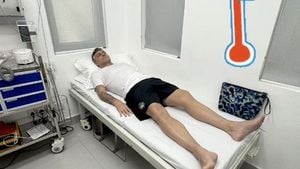A deadly and mysterious illness, known tentatively as "Disease X," has erupted in the Democratic Republic of Congo (DRC), claiming the lives of at least 143 individuals, with many victims being young children. This outbreak has raised significant alarm among health officials and the global health community, as they scramble to identify the nature of the disease and its potential spread.
The strange illness has been linked to the Panzi health zone located within Kwango province, which is approximately 700 kilometers from Kinshasa, the capital of DRC. Officials reported the illness started making its rounds by the end of October, and by late November, there was confirmation of over 376 cases, leading to the dire spike in fatalities.
Dieudonné Mwamba, director of the National Public Health Institute, highlighted the urgent need for investigation, stating, "We don't know if we are dealing with a viral or bacterial disease." Symptoms currently reported among those afflicted include fever, cough, runny nose, headache, and body aches, showing characteristics similar to the flu.
The situation is particularly troubling as health authorities noted nearly half of the cases were found among children younger than five years old. Many of these young patients were already suffering from malnutrition, exacerbated by the challenging health conditions prevalent within the region. Health Minister Samuel-Roger Kamba emphasized, "40% of cases occurred in children younger than five, most of whom were already fragile due to malnutrition."
The existing healthcare infrastructure has proven inadequate for dealing with this surge of illness. Lucien Lufutu, president of the civil society consultation framework for Kwango province, shared insights on the lacking resources at local health facilities, saying they are not equipped to handle the influx of impeding patients. "There is a lack of medicines and medical supplies, since the disease is not yet known. We are calling for international assistance to help us cope with this situation," he stated.
Given the challenging geographical conditions, including difficult-to-navigate roads and the rainy seasons, the deployment of epidemiological teams from health organizations has become imperative. Reports confirm the World Health Organization (WHO) is establishing teams to work alongside DRC health officials to facilitate diagnostic processes, collect samples, and develop treatment plans.
Jean Kaseya, the director general of Africa CDC, remarked on the complex nature of the outbreak, noting, "At the Emergency Operation Center for Public Health, we're already positioned to respond within 24 hours to join the [local] health zone." The initial steps include reinforcement of disease surveillance and monitoring efforts which can identify the cases and combat the potential epidemic.
Experts within the public health domain stress the importance of swift, coordinated efforts to monitor and respond to the crisis. Health experts warned not to speculate widely about the illness until definitive test results are available. Dr. Jake Dunning from the University of Oxford pointed out, "Typically, outbreaks like this may be contained without spreading widely. We may or may not ever find out the exact bug causing these infections, so caution and extensive investigation are necessary.”
The WHO has also informed the public health sector to remain on alert, especially since the DRC has faced severe outbreaks of diseases like Ebola and typhoid fever historically. With the malnutrition rates soaring at around 40% within the Panzi health zone, these factors could significantly heighten the vulnerability of the local population against this newly emergent threat.
The presence of potential causative pathogens remains under scrutiny. Possible candidates indicated include known infections like malaria and measles, leading health officials to search for diagnostic tests for these infections, as well as for flu and COVID-19, which could assist with delineation of the mysterious illness.
Ongoing surveillance is pertinent not only within Congo but also on broader international platforms as public health officials recognize the potential risk of cross-border transmission. Hong Kong was recently swift to announce enhanced health screenings for travelers arriving from African nations amid the outbreak. Meanwhile, the United States is monitoring international arrivals, including reports of patients with flu-like symptoms, indicating the global vigilance needed against such outbreaks.
Careful observation of the situation is necessary, as respiratory diseases have the potential to spread rapidly within communities, particularly those already grappling with issues like poverty and malnutrition. Experts continue to stress the importance of addressing these underlying health challenges, stating, "Good sanitation and healthcare infrastructure must accompany any response to outbreaks like this to mitigate risks effectively." Potential measures could include improving access to clean drinking water, enhancing hygiene practices, and providing medical care to vulnerable populations.
Health authorities are emphasizing the importance of the community's cooperation during this crisis to tackle potential sources of transmission. Preventative measures advised include avoiding contact with deceased individuals and promoting additional sanitary practices within affected areas.
This deadly circumstance is another painful reminder of the vulnerability of health systems worldwide, particularly within impoverished nations. The combination of geographical challenges, a lack of healthcare facilities, and the global urgency to contain such outbreaks is evident. While the situation remains fluid, concerted efforts are being directed to curtail the spread of Disease X, which is likely to loom large over DRC for the foreseeable future.
Despite the challenges, health officials from Congo and international bodies remain hopeful. With sufficient assistance and timely intervention, the emergence of Disease X can potentially be contained, preventing another crisis within the fragile healthcare system of the DRC. The vigilance and readiness of the global health community will play pivotal roles as the situation develops, showcasing the shared responsibility of today's health systems amid this turbulent public health environment.



